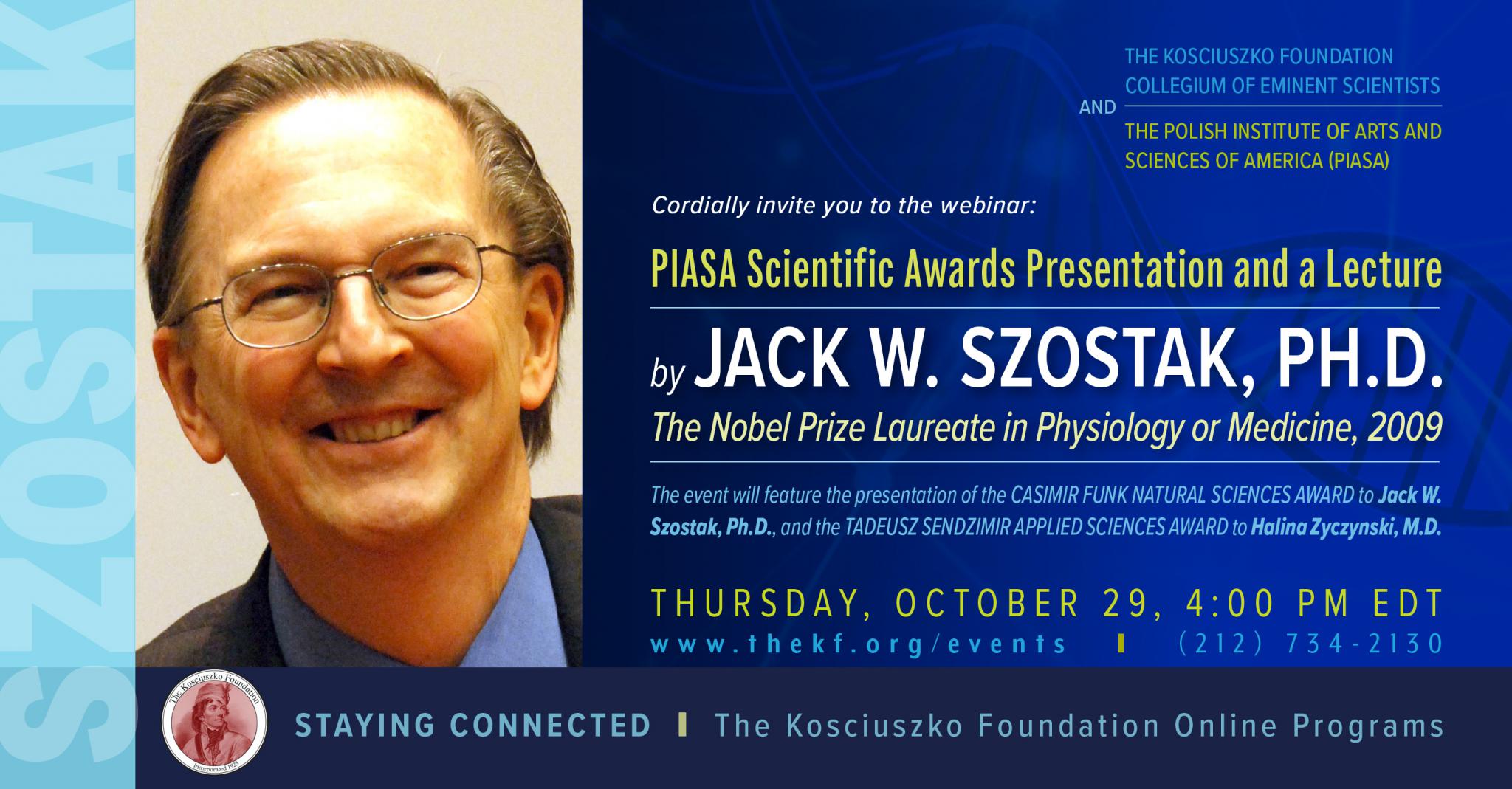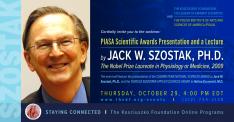
KF Online Programs
PIASA Scientific Awards Presentation and a Lecture by Jack Szostak, Ph.D.
Thursday, October 29, 2020, at 4:00pm
Watch the recording of the webinar HERE
The Kosciuszko Foundation Collegium of Eminent Scientists and the Polish Institute of Arts and Sciences of America (PIASA) cordially invite you to the joint webinar honoring the Nobel Prize winning scientist - Jack W. Szostak, Ph.D.
The event will feature the presentation of the PIASA Scientific Awards:
- The Casimir Funk Natural Sciences Award to Jack W. Szostak, Ph.D.
- The Tadeusz Sendzimir Applied Sciences Award to Halina Zyczynski, M.D.
Thursday, October 29, 2020, 4:00 PM EDT
The event is free and open to the public. Registration required. Spots are limited and available on a first come, first serve basis.
Jack W. Szostak, Ph.D. is a Professor of Chemistry and Chemical Biology at Harvard University, Professor of Genetics at Harvard Medical School, Investigator at Howard Hughes Medical Institute, and Alexander A. Rich Distinguished Investigator at Department of Molecular Biology, Massachusetts General Hospital. In 2009, along with Elizabeth Blackburn and Carol Greider, Dr. Szostak was awarded with the Nobel Prize in Physiology or Medicine for discovering structure of telomeres and revealing their function and mechanism by which they protect chromosomes from degradation during the successive cell divisions.
Dr. Szostak received his B.Sc. from McGill University in Montreal in 1972, and then conducted his graduate research at Cornell University, Ithaca, N.Y., obtaining his Ph.D. in 1977. Dr. Szostak moved to the Sidney Farber Cancer Institute and Harvard Medical School in 1979, and then to Massachusetts General Hospital in 1984. During the 1980s he carried out research on the genetics and biochemistry of DNA recombination, which led to the double-strand-break repair model for meiotic recombination.
In addition to the Nobel Prize, Professor Szostak received numerous highly prestigious awards including: United States National Academy of Sciences Award in Molecular Biology (1994), Hans Sigrist Prize from the University of Bern, Switzerland (1997), Genetics Society of America Medal (2000), and Dr. H.P. Heineken Prize in Biophysics and Biochemistry (2008).
Currently, Dr. Szostak's research interests have focused on the challenges of understanding the origin of life on Earth and construction of artificial cellular life. More extensive description of the current interests of Prof. Szostak can be found at: https://origins.harvard.edu/pages/research-spotlight-jack-szostak or: https://molbio.mgh.harvard.edu/szostakweb/
Halina M. Zyczynski, M.D. - Professor, Department of Obstetrics, Gynecology & Reproductive Sciences, University of Pittsburgh/Director of Division of Urogynecology and Reconstructive Pelvic Surgery/Medical Director, Women's Center for Bladder and Pelvic Health.
Dr. Zyczynski's research interests are clinical with a focus on short and long-term anatomic and functional outcomes of treatments for urinary and fecal incontinence and prolapse as well as related cost-effective diagnostic testing. She is the site Principal Investigator of the NICHD Pelvic Floor Disorders Network since 2001 and served for 12 years on the steering committee of the NIDDK Urinary Incontinence Treatment Network.
More: https://mageewomens.org/investigator/halina-zyczynski-md
https://www.obgyn.pitt.edu/people/halina-m-zyczynski-md


